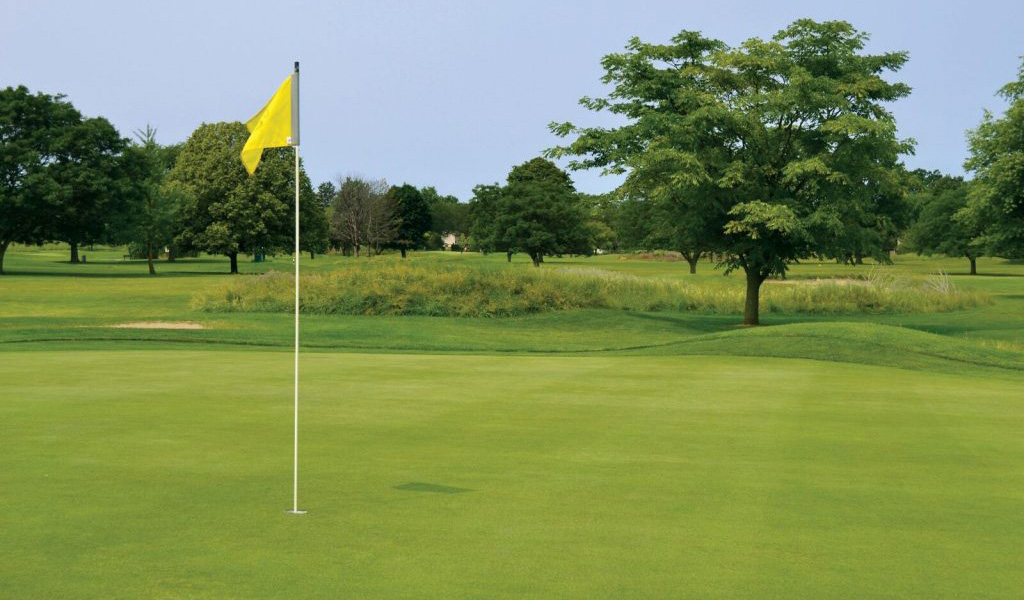Motor City Magic: Here’s One Reason Why.
by Abbey Hart for Golfdom (Reprinted by National Golf Foundation August 2019)
The Motor City’s four major courses — Rackham, Palmer, Chandler and Rouge Park — have been graced by both local and famous golf lovers, including Motown legend Smokey Robinson and heavyweight boxing champion Joe Louis, who played in Detroit golf leagues 50-60 years ago.
In recent years, the story of public golf in Detroit hasn’t been so rosy. Until 2017, the courses were managed by a company under a short-term contract. The result was a lack of investment leading to dying greens, bunkers crowded with weeds, poor drainage, flooding, worn-out clubhouses and pavilions — and a sharp drop-off in golfers.
These conditions weren’t going to fly with Angie Hipps, contract manager for Detroit’s General Services Department, which oversees the golf courses.
Hipps isn’t a city employee bent only on managing money and resources — she cares about course conditions. She was the first female greens superintendent in Michigan when she worked at Rogell Golf Course, a former city golf course, from 1989 to 2005, before the venue closed in 2007.
The city enlisted the help of the National Golf Foundation (NGF), which investigated conditions at each of the city’s four golf courses. The resulting 152-page report was eye-opening for city officials for its hefty price tag: $15 million to repair all four locations.
There was one other thing Hipps noticed: “Most of the problems could be solved with basic agronomy practices,” she says, which indicated to her that getting the right turf professionals in place was key to saving these beloved courses.
The city opted to close Palmer Golf Course, situated in Palmer Park. (The park also houses the private-membership Detroit Golf Club, which in June hosted the Rocket Mortgage Classic to much fanfare.)
Turning its attention to the remaining three courses, NGF recommended a bridge contract with a management company to help raise the quality of turf and bring golfers back. The city chose North Carolina-based Signet Golf Associates, headed up by owner Peter Dejak, and the city allotted $2.5 million across all three courses to start improvements.
The bridge contract with Signet lasts until March 2020, when the city will move toward an extended long-term contract with a management company.
Signet receives an upfront management fee to handle the financials, but the city reimburses it for all expenses, including maintenance crew salaries and equipment. The city has final say in all purchases, management and superintendent positions and improvements. Hipps’ days often are spent crisscrossing the city, visiting the courses and meeting with superintendents, course managers and city officials. She and Dejak keep in daily contact about the progress of each course.
Dejak is a former superintendent, with stints at Augusta National, Atlanta Athletic Club and Pinehurst National. He began Signet in 1995 with golf construction and management services.
“What I find here is that I’ve never seen a group of courses that are more community oriented,” Dejak says. “The individuals that go to these courses, they really take ownership like it’s their local neighborhood. Some municipalities are like that, but this area even more so.”
It was a tough transition when Signet came on board. “The people who came (to the courses), they weren’t happy because it wasn’t what it could be,” he says. “Now, everyone’s given such great support. You’re driving the course, they’re high-fiving you, and it’s really neat.”
To oversee the management alongside Hipps, Dejak handpicked a big name in Detroit golf to become the director of golf for Signet: Karen Peek, LPGA — the first African-American LPGA professional in the United States. Peek draws on her own experience as a golfer in Detroit, starting out with her first lesson as a teenager in Palmer Park in 1960 and spending more than 30 years as a golf pro in the Detroit area.
The partnership between the City of Detroit and Signet was forged, but this year’s golf challenges posed a different problem — a snowy winter followed by relentless spring rains.
Still, since Signet began improvements in 2018, revenue is up 27 percent over all three courses from last year.
Now that the golf season is in full swing, here’s how the courses began to rewrite their story.

